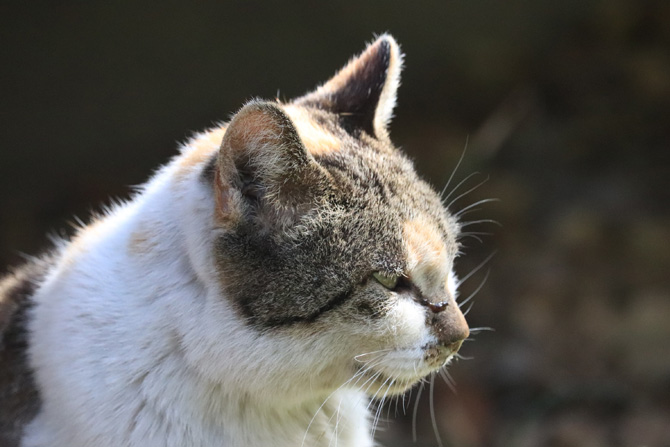Does your purring pal seem to forget where his food bowl is? Have your neighbours found your cat meowing outside their back door instead of yours? These could be signs your cat has feline dementia.
While data on the prevalence of feline dementia in Australian cats is scarce, sources say more than 50% of cats over the age of 15 years suffer from varying degrees of feline dementia.
Feline dementia (AKA feline cognitive dysfunction) is a slow decline in cognitive abilities as a result of age-associated changes in the brain. Feline dementia tends to come on over a long period of time with symptoms worsening as time goes on.
Signs of feline dementia
When a cat has feline dementia its memory, sight, hearing, ability to learn and awareness of its surrounds can all start to deteriorate. Unfortunately, this can affect your meowing mate’s sleeping patterns, eating habits and behaviour.
A cat with feline dementia can become aggressive, anti-social and anxious. According to the American Society for the Prevention of Cruelty to Animals (ASPCA), it’s important not to just put these changes down to the fact your cat is getting old. Indeed, there may be simple changes you can make to assist and support your purring pal.
Of course, the first step in helping your cat is recognising the signs of dementia. Here are some common symptoms:
- Goes to the toilet outside the litter box
- Seems unable to recognise familiar places and people
- Gets lost (i.e. turns up as your neighbour’s house instead of yours)
- Has difficulty navigating certain spaces or objects
- Has become more restless or irritable
- Wanders aimlessly
- Changes in appetite; eats less
- Spends less time grooming
- Is more vocal
- Sleeps more during the day as is more often awake at night
Taking action
If you suspect your cat may have feline dementia, it’s important to take him or her to your local vet for a diagnosis. Certainly, you will have noticed changes in your cat’s behaviour, so even if feline dementia is ruled out, it’s worthwhile knowing if there is any other medical reason for this behaviour change. Other possible reasons for similar behaviour are deafness, hyperthyroidism and vision deterioration or loss.
If your cat does indeed have dementia there are some actions you can take to support your kitty.
Increase the number of litter trays around the home to assist your cat in eliminating in an appropriate place.
Maintain a consistent schedule and don’t re-arrange your furniture. If your cat is disorientated he needs the comfort of a reliable environment. Changing around furniture can cause your cat to become more distressed.
Consider confining your kitty to a certain area of the house, particularly if you have multiple floors or a very large home.
To help regulate your cat’s sleeping patterns, try engaging your feline friend in playtime during the day to help encourage him or her to sleep better during the night.
Of course, while it can be incredibly frustrating, try not to get angry with your purring pal. After all, he or she doesn’t understand these changes and is looking to you for comfort and care.
Treatment for feline dementia
Although there is no cure for dementia in cats, there are some measures you can take to help manage the symptoms and its progression. You may want to consider changing your cat’s diet, including supplements or discussing medication options with your vet.
Medicines used to treat feline dementia include anti-anxiety drugs and antidepressants. When it comes to dietary supplements, antioxidants, omega-3 fatty acids, S-adenosyl-L-menthionine and L-theanine are thought to be beneficial. Your vet may recommend a special diet and/or nutritional supplements.
Knowing the actions you can take to help your cat feel safe, secure and loved is essential to the long-term wellbeing of your feline friend.
Are you caring for a cat with feline dementia?
Information sources:
- Does your cat have dementia? A guide for owners of older felines. Vet Hep Direct. May 2014. Accessed online March 2020 via: https://vethelpdirect.com/
- Older cats with behaviour problems. American Society for the Prevention of Cruelty to Animals (ASPCA). Accessed online March 2020 via: https://www.aspca.org/pet-care/cat-care/common-cat-behavior-issues/older-cats-behavior-problems
- Stilwell, N. Unpacking feline dementia: A veterinary guide. June 2019. DMV 360. Accessed online March 2020 via: https://www.dvm360.com/view/unpacking-feline-dementia-veterinary-guide







Leave A Comment